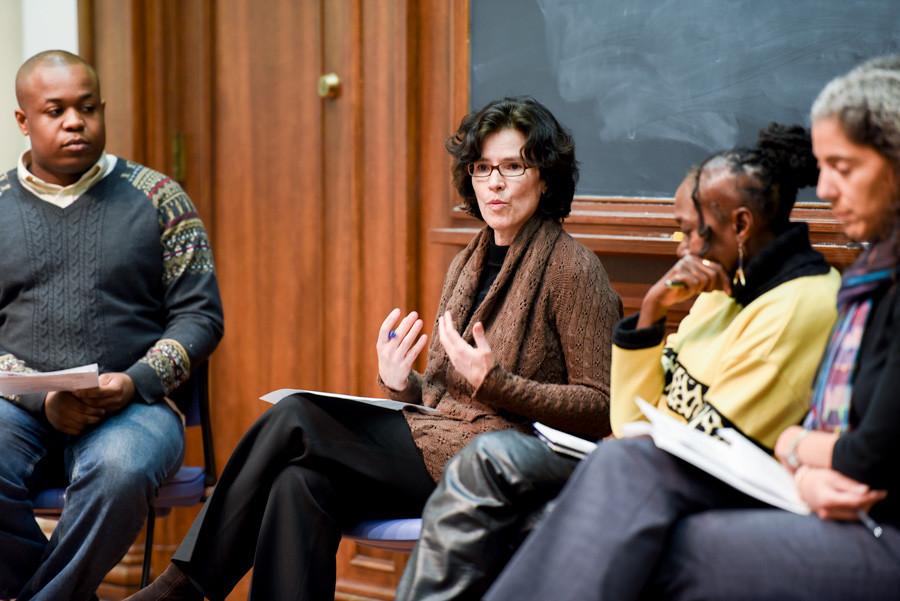Unshackle NU panel discusses mass incarceration, effects on communities
Zack Laurence/The Daily Northwestern
Martha Biondi discusses the role police brutality plays in mass incarceration. Biondi spoke as part of a panel hosted by Unshackle NU.
February 9, 2016
The United States’ mass incarceration illustrates the many ways racism persists in this country, panelists said at an event hosted by Unshackle NU on Monday night in Harris Hall.
Panelists discussed police brutality, the war on drugs and the greater social effects of mass incarceration on different communities. The panel included history and African American studies Prof. Martha Biondi, Deborah Small, founder of Break the Chains, an organization the works to reform drug policy and engage with communities affected by punitive drug laws, and sociology and African American studies Prof. Mary Pattillo.
The panel was the fourth in a series of educational events hosted by Unshackle NU, a student divestment movement calling for NU to remove its investments from private prisons and companies its members say contribute to mass incarceration.
A critical component to mass incarceration is police brutality and the culture that allows it to continue, Biondi told the crowd of more than 50 people. Biondi, who has advocated for reparations for police torture in Chicago, cited numerous examples and statistics to illustrate the racialization and institutionalization of police violence.
“The police officer is not just the person on the street, on the front lines who makes the arrest,” Biondi said. “(The police officer) is in many ways a partner of the prosecutor … So when that police officer discharges their weapon and shoots and kills a person, and there’s an investigation into whether or not that officer should be indicted, prosecutors are reluctant to do that.”
Mass incarceration is invariably linked to a history of industrialized addiction, said Small, who has served as legislative director of the New York Civil Liberties Union. Slavery initially serviced industries of addictive substances including sugar, alcohol and tobacco, Small said. Mass incarceration as an industry began in the same vein and is based on punishing people for addictions promoted in communities of color, she added.
“(There is an) addiction to punishment, too, as a main tool for behavior modification,” Small said. “What we’re talking about here is the continuation of a process that has been woven in the fabric of this country since the beginning.”
Medill sophomore Krish Lingala, a former Daily staffer who attended the event, said he appreciated in particular Small’s perspectives on drugs and their relationship with the criminal justice system.
“A lot of what Deborah Small had to say stook out to me particularly because it was less about the facts of the criminal justice system and more about the way we think about it,” Lingala said. “Rather than think about how we’re going to punish someone, we should ask should we punish them at all.”
Incarcerated individuals are not the only ones affected by mass incarceration, Pattillo said. Funding that could go toward developing overcrowded schools and public facilities instead go toward keeping community members in prison, she said. Pattillo discussed the concept of “million dollar blocks,” which are urban areas where funding per resident is exceptionally high, but only because those residents are incarcerated and the cost of incarceration is high.
Pattillo also said the ways in which police treat communities of color versus affluent white communities in regards to drugs illustrate the racialization of the criminal justice system. She contrasted the example of poor communities of color in Chicago, who often face zero-tolerance policies, to an affluent suburb of Buffalo, New York, that emphasized more education focused justice programs for youth.
“(Educational justice programs are) the kind of response everyone merits,” Pattillo said, “but only some people get.”
During an open Q&A, panelists were asked what motivates their work in studying and fighting social injustices. Pattillo said active participation beyond the classroom drives her through emotional strains to fulfill her work.
“It’s one thing to study problems and immerse yourself in the study of all manner of social ills,” Pattillo said, “but what I think is inspiring and heartening is when you’re engaged in a collective, when you’re engaged with other people talking about how to create solutions and how to move to make the world a better place.”
Medill senior Matthew Wright, who moderated the event, said he was satisfied with the panel and hoped audience members learned from the discussion.
“If you were unfamiliar with some of the different things that were being said, it was a great opportunity to learn and to really appreciate what these women were sharing with us,” Wright said.
Email: [email protected]
Twitter: @matthewchoi2018


